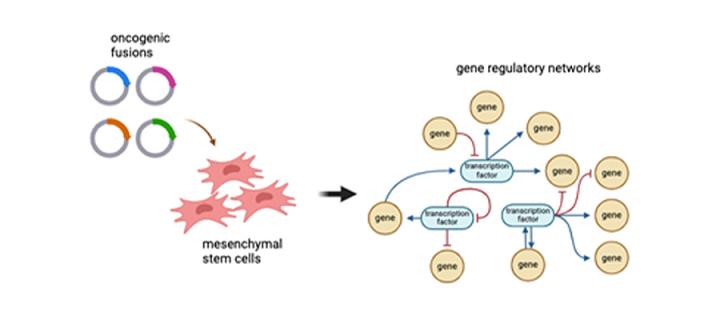Integrating Fusion-Proteins Molecular Signatures for Advancing Sarcoma Diagnosis and Therapy
Supervisors: Dr Nezha Benabdallah & Dr Daria Bunina

Sarcomas are a group of cancers impacting bones and soft tissues that often display a distinctive genetic background characterised by minimal mutations and genetic stability. Around 40% of sarcomas arise from a single chromosomal translocation, resulting in a fusion protein often involving chromatin regulators, which serves as an oncogenic driver. These fusions form chimeric transcription factors that alter gene expression, disrupting critical pathways that govern cell growth, differentiation, and survival. Despite having a clear driver, there has been little progress in translating genomic discoveries towards understanding the biology of distinct genotypes in sarcomas and developing biology-informed diagnostic tools or treatments.
In this project, we will investigate the impact of oncogenic fusions on chromatin and gene regulation to unravel if they form distinct sarcoma sub-types, what markers can be used for their classification to improve diagnostic precision and how this can guide the development of targeted therapeutic approaches?
By introducing oncogenic fusions into isogenic backgrounds we will analyse their molecular signatures through exploration of their influence on gene expression (RNA sequencing), chromatin structure (ATAC-seq), and genomic profile (CUT&RUN). We will then integrate this data using the computational gene regulatory networks (GRaNIE) and transcription factor activity (diffTF) pipelines to investigate the direct impact of these chimeric transcription factors on their target genes. Furthermore, we seek to reveal what additional critical transcription factors they activate and their role in driving cellular transformation.
This project establishes three main aims: 1) classify oncogenic fusions by their unique molecular signatures to identify new sarcoma subgroups, 2) discover biomarkers for quicker, more precise sarcoma diagnosis, and 3) develop targeted treatment strategies for these subgroups. Our goal is to advance sarcoma classification and understanding by identifying shared oncogenic processes, thereby improving current diagnosis tools and enabling the development of targeted treatments.
Nezha Benabdallah Research Group
For informal enquiries about this project, please contact Nezha Benabdallah (Nezha.Benabdallah@ed.ac.uk).


